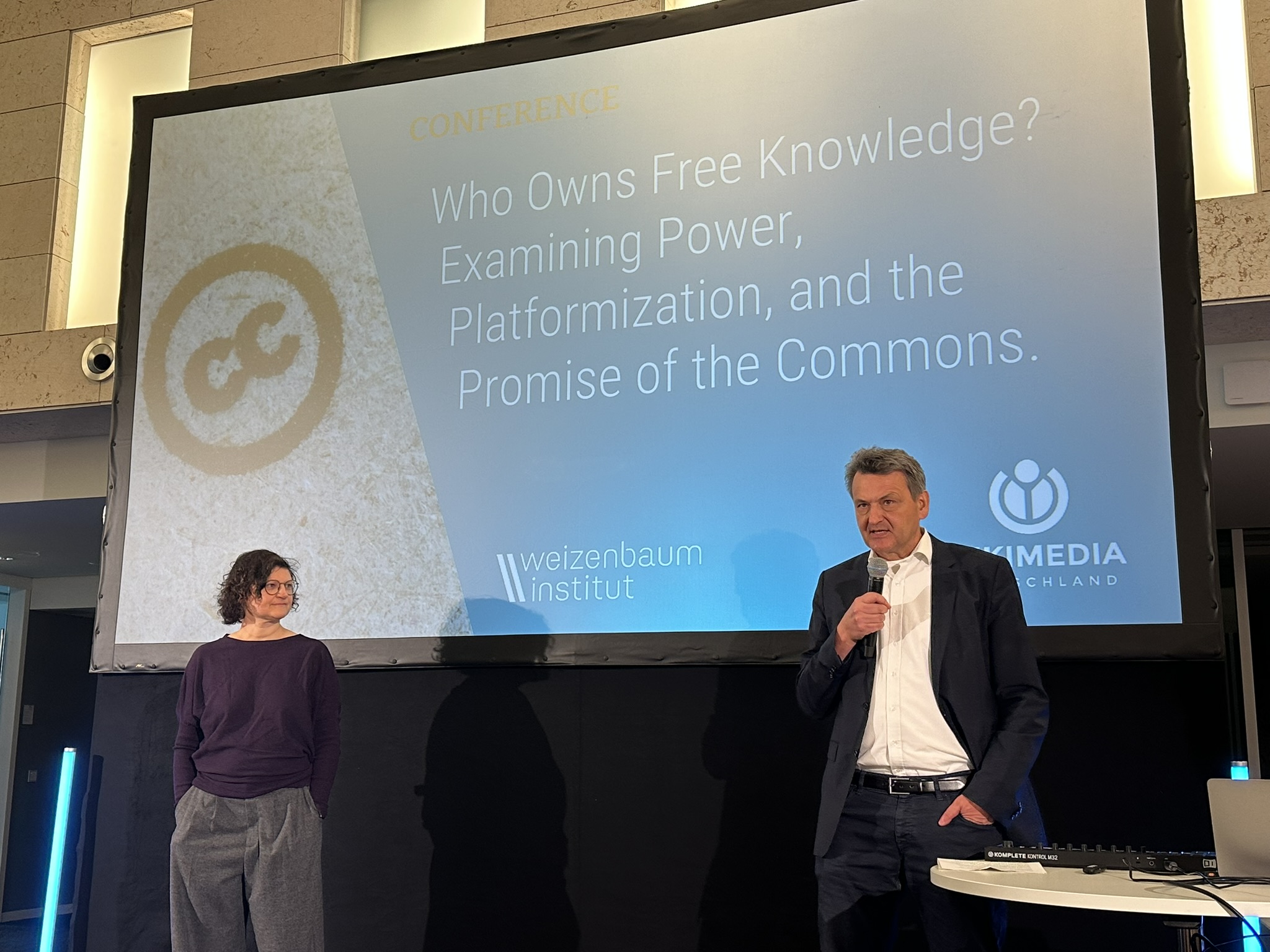
Who Owns Free Knowledge?
14.04.2025Digital researchers and free knowledge practitioners came together at the Weizenbaum Institute to examine the power hierarchies embedded in free knowledge today, and to imagine a more just future of the commons.
On April 10, around 80 researchers and open knowledge enthusiasts gathered at the Weizenbaum Institute for the interdisciplinary conference, Who Owns Free Knowledge? Examining Power, Platformization, and the Promise of the Commons. They spent the day discussing key issues such as epistemic authority in digital spaces, asymmetries in knowledge production, and the challenges of platform governance—and their implications for research, policy, and the practice of open knowledge. This first joint event by the Weizenbaum Institute and Wikimedia Germany had been almost two years in the making. It was clear to the organizers that, to critically examine how historical legacies and current technological developments influence contemporary knowledge systems, it is necessary to bring together both scholars and practitioners.
Both Christoph Neuberger, Scientific Director of the Weizenbaum Institute, and Franziska Heine, Executive Director of Wikimedia Deutschland, highlighted in their introductions the importance and uniqueness of this cooperation. Mr. Neuberger emphasized the common aim of both organizations: "We share Wikimedia Germany’s commitment to ensuring that knowledge remains freely accessible and of high quality. This concern is a central focus of our research at the Weizenbaum Institute."
Ms. Heine added how much there is to learn from one another: "The conference is a testament to our shared vision of fostering a more equitable and inclusive knowledge ecosystem. Our perspectives complement each other. The Weizenbaum Institute brings well-founded research from a variety of disciplines to the table, while Wikimedia Deutschland can draw on its experience with community involvement in the digital knowledge society. Together, we aim to bridge the gap between academic rigor and community-driven initiatives, fostering a dialogue that is both insightful and actionable."
Discussing the power structures shaping free knowledge today and exploring pathways toward more equitable and inclusive knowledge ecosystems means asking hard questions. It requires a critical look at the role of the Enlightenment in knowledge production and an examination of how historical legacies and contemporary technological advancements shape our understanding and access to information.
meLê yamomo’s artistic intervention put this into practice. His performance/conversation titled »Tumrap susilaning gěndhing winor laguning lělagon« (which translates to “In harmony with the song fused by singing”) centered on the historical contexts of knowledge production. In his work, yamomo investigates how bodies, aesthetics, and knowledge migrate across geographies and demonstrates how knowledge is inherently embodied. "Knowledge is not an exotic land that can be discovered," he stated. His research on the archival and extraction of sounds from the communities that created them asks how artists can create new imaginaries when certain sounds have been lost to colonialism.
Following this, three thematic sessions explored different aspects of the power hierarchies embedded in today’s knowledge spaces and imagined collective paths toward a decolonial future.

The session “The Future of the Knowledge Commons,” organized by Bianca Herlo and Andreas Unteidig (Lucerne School of Design, Film and Art), examined the hidden hierarchies—geographical, gender-based, and privileged—within movements that claim openness and inclusivity. Renata Avila (Open Knowledge Foundation), Gemma Copeland (Common Knowledge), and Elizabeth Calderón Lüning (Democratic Society, DemSoc) discussed strategies for democratizing knowledge and fostering more equitable participation in the digital commons.
The session “Role of Enlightenment in Knowledge Production,” organized by Riham Abed-Ali, Alina Casanova, and Jan-David Franke (Wikimedia Deutschland), focused on the Enlightenment’s legacy in shaping contemporary knowledge systems. Nikita Dhawan (TU Dresden), Kelly Foster, and meLê yamomo (University of Amsterdam) showed through various examples how Enlightenment ideals—while associated with intellectual progress—also intersect with colonial and imperial ideologies. The session asked how the Enlightenment continues to influence knowledge production and power structures today, and whether platforms like Wikipedia can be understood not only as digital public spaces but also as digital counter-publics—less constrained by patriarchal values.
The session “Epistemic Authorities on Digital Platforms – Who Has the Power to Inform?”, organized by Jakob Ohme (Weizenbaum Institute), zoomed in on how epistemic authority is defined and exercised in the digital age. With journalists no longer the sole gatekeepers of information, algorithms and platform policies now shape what information is visible. The session asked: Who informs us, whom do we inform, and how can counter-knowledge become a form of resistance?

In the afternoon Barcamp sessions, participants brought their own questions and perspectives to the table, tying in worries about the current political climate and policy shifts. Discussions addressed the ownership of public service media content and the role of platforms like the Fediverse and Wikipedia in supporting democratic access to free knowledge. Another session explored how to analyze information policies like censorship, media law, disinformation, and the right to information. A future workshop focused on the idea of a “Digital Knowledge Space” within the Anthropocene, encouraging reflexivity in how knowledge is shaped by environmental and societal challenges. Participants also debated how to let go of the information monopoly and examined the intersection of digital sovereignty and interoperability. Further sessions tackled the safeguarding of research data and cultural heritage from U.S. jurisdiction, and the delicate balance between visibility and vulnerability for marginalized groups in digital spaces.
The poetry slammer MiKo Berry ended the day with a poetic summary. All in all, it was a conference of enlightening thoughts and new questions.